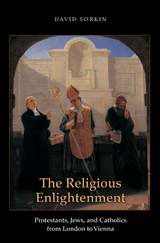Author examines relationship between Enlightenment, religion
In researching the relationship between Judaism and Enlightenment thought, David Sorkin found significant misunderstanding about the relationship between the Enlightenment and religion in general. His findings, which he discusses in his book The Religious Enlightenment: Protestants, Jews and Catholics from London to Vienna (Princeton University Press, 2008), resonate with contemporary issues.

“The prevalent dichotomy in politics between supposedly ‘believing’ conservatives and ‘secular’ or ‘godless’ liberals is based on the presumption that the Enlightenment was a secular phenomenon and dividing point. That’s a historical mistake that we need to correct,” says Sorkin, a professor of history and Frances and Laurence Weinstein Professor of Jewish Studies.
Countries in 17th century Europe struggled to create order despite religiously divided populations, significant religious minorities and sovereigns with different religions from the population. The Religious Enlightenment argues that shared ideas such as “natural religion” — an accessible morality based in common foundations of belief — created tolerance and collaboration across religious, cultural and political boundaries. Sorkin’s use of what he calls “second rank figures” illuminates the contributions of figures who bridged these political and philosophical gaps, many of whom lost prominence over time because of a misguided emphasis on secularity.
Sorkin came to UW–Madison in 1992 with the aim of creating a certificate program and, eventually, a major in Jewish studies. The program reached both goals by 2001. Far from inhabiting some arcane corner of academia, Sorkin seeks to reinforce connections between his area of study and the larger world, whether placing Jewish history within the larger context of European societies or drawing lessons from the Enlightenment that resonate today.
“One of the things I feel most proud of is that, in addition to training Ph.D.s to European Jewish history itself, I have a lot of other students who do European history and do a prelim in European Jewish history, ” says Sorkin. “That adds to their understanding. One of my goals is to integrate European Jewish history with European history at both the undergraduate and graduate levels.”
This commitment to interdisciplinary connection served Sorkin well during his time as both a senior fellow and, later, director of the Institute for Research in the Humanities, which he calls “one of the jewels of UW–Madison.” In some ways, the institute has nurtured the type of intellectual discourse that Sorkin describes in his book as a “republic of letters” — correspondence among religious, political and philosophical figures at many levels of public and private life. Still, he laments the decline of reasoned discourse in the greater sphere.
“I think part of the problem is that we now live in an era of experts, and political issues are kind of left to the experts — social scientists, economists and the issues just aren’t discussed in broader philosophical terms as much. Those aren’t the people who get listened to.”
He notes that many current leaders in the “evangelical right” have moved from rallying around polarizing issues like abortion to broader issues like poverty, equality and the environment. In this way, perhaps, these leaders echo the themes of commonality and shared concern that Sorkin describes in his book… but it’s still a careful mix.
“I would like to see more of a bridge between philosophy and theology in politics, sure,” he says. “At the same time, I still have to say that I’m a champion of the separation of church and state.”
